과업중심교수법(Task-Based Language Teaching)
TBLT (Task-Based Language Teaching)
TBLT draws on
Role of tasks
4 major categories of team performance function
Approach
Theory of language
Theory of learning
Design
Objectives
Syllabus
Types of learning and teaching activities
Learner roles, teacher roles, and the role of instructional materials
Procedure
Conclusion
▣ 4 major categories of team performance function
① orientation functions
: process for generating and distributing information
② organizational functions
: process necessary for members to coordinate actions
③ adaptation functions
: process occurring as team members adapt their performance to each other
④ motivational functions
: defining team objectives & energizing the group
▣ Most TBLT studies have focused on the nature of occupational tasks
---> academic tasks (1970s~) also have been the focus of considerable attention
■ academic task
: the mechanism through which the curriculum is enacted for students (Doyle, 1983)
Approach
▣ Theory of language
■ Langage is a means of making meaning
■ Multiple models of language inform TBI
- structural, functional, interactional models
■ Lexical units are central
- lexical phrases, sentence stems, prefabricated routines, and collocations
■ Focus on conversation
- speaking and trying to communicate is basic for SLA in TBI
▣ Theory of learning
■ Tasks provide both the input and output processing
■ Task activity are motivational
■ Language difficulty fine-tuned for particular pedagogical purpose
Design
▣ Objectives
Goals in TBLT are ideally to be determined by the specific needs of particular learners. According to Long and Crookes(1993), selection of tasks should be based on a careful analysis of the real-world needs of learners.
eg. The English Language Syllabus in Schools Malaysian (1975)
- giving all Malaysian secondary school leavers the ability to communicate accurately and



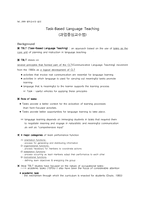
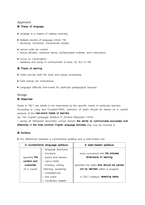
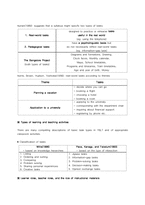
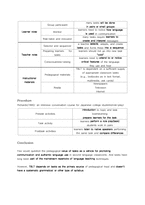
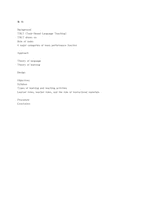
 분야
분야


